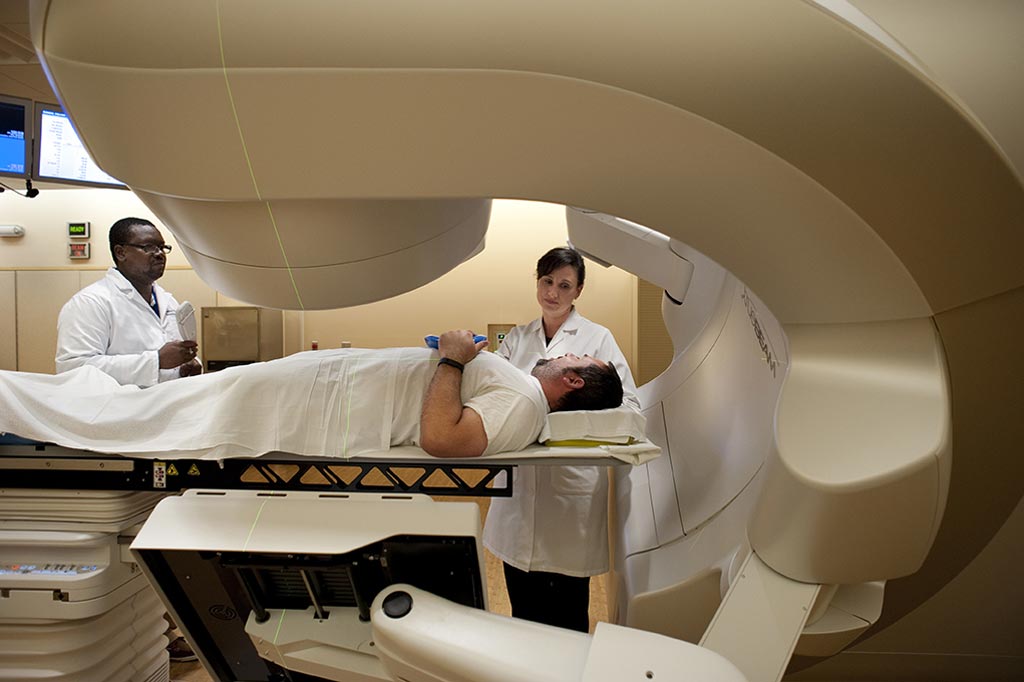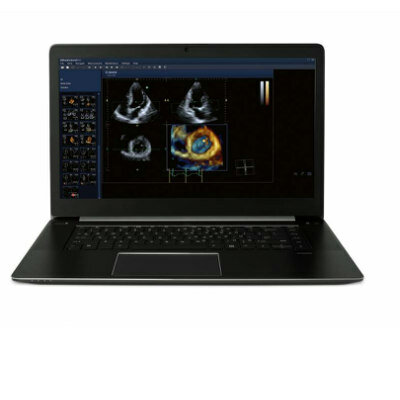Single RT Treatment Relieves Spinal Compression Symptoms
|
By MedImaging International staff writers Posted on 16 Jun 2017 |

Image: A new study shows a single dose of radiation therapy can treat metastatic spinal cord compression (Photo courtesy of NCI).
A new study suggests that a single radiation therapy (RT) treatment is as effective as a full week of RT for treating spinal cord compression (SCC), a common complication of metastatic cancer.
The phase III clinical trial, conducted at Mount Vernon Cancer Centre (Northwood, United Kingdom), enrolled 688 patients (median 70 years, 73% male) with metastatic prostate (44%), lung (18%), breast (11%), and gastrointestinal cancers (11%). The researchers randomly assigned the patients to receive external beam spinal canal radiation therapy either as a single dose of 8 Gy or as a 20 Gy dose split in five doses over five days. The primary endpoint of the study was ambulatory status, measured on a four-point scale.
The results showed that at eight weeks, 69.5% of patients who received single-dose RT and 73.3% of those who received five doses had ambulatory status 1 (normal walking) or 2 (able to walk with walking aid), showing that both shorter- and longer-course RT treatments helped patients stay mobile. The median overall survival was similar in both groups, as were side effects, but mild side effects were less common in the single-dose group. The study was presented at the American Society of Clinical Oncology (ASCO) annual meeting, held during June 2017 in Chicago (IL, USA).
“Our findings establish single-dose radiotherapy as the standard of care for metastatic spinal canal compression, at least for patients with a short life expectancy. For patients, this means fewer hospital visits and more time with family,” said lead author and study presenter oncologist Peter Hoskin, MD. “Longer radiation may be more effective for preventing regrowth of metastases in the spine than single-dose radiation. Therefore, a longer course of radiation may still be better for patients with a longer life expectancy, but we need more research to confirm this.”
Metastatic SCC is a spinal cord or cauda equina compression by direct pressure and/or induction of vertebral collapse or instability, which leads to irreversible neurological damage such as paraplegia or tetraplegia, depending on the level of the lesion. Up to 10% of all cancer patients will have metastatic SCC, and early diagnosis and treatment are essential to prevent permanent neurological damage.
Related Links:
Mount Vernon Cancer Centre
The phase III clinical trial, conducted at Mount Vernon Cancer Centre (Northwood, United Kingdom), enrolled 688 patients (median 70 years, 73% male) with metastatic prostate (44%), lung (18%), breast (11%), and gastrointestinal cancers (11%). The researchers randomly assigned the patients to receive external beam spinal canal radiation therapy either as a single dose of 8 Gy or as a 20 Gy dose split in five doses over five days. The primary endpoint of the study was ambulatory status, measured on a four-point scale.
The results showed that at eight weeks, 69.5% of patients who received single-dose RT and 73.3% of those who received five doses had ambulatory status 1 (normal walking) or 2 (able to walk with walking aid), showing that both shorter- and longer-course RT treatments helped patients stay mobile. The median overall survival was similar in both groups, as were side effects, but mild side effects were less common in the single-dose group. The study was presented at the American Society of Clinical Oncology (ASCO) annual meeting, held during June 2017 in Chicago (IL, USA).
“Our findings establish single-dose radiotherapy as the standard of care for metastatic spinal canal compression, at least for patients with a short life expectancy. For patients, this means fewer hospital visits and more time with family,” said lead author and study presenter oncologist Peter Hoskin, MD. “Longer radiation may be more effective for preventing regrowth of metastases in the spine than single-dose radiation. Therefore, a longer course of radiation may still be better for patients with a longer life expectancy, but we need more research to confirm this.”
Metastatic SCC is a spinal cord or cauda equina compression by direct pressure and/or induction of vertebral collapse or instability, which leads to irreversible neurological damage such as paraplegia or tetraplegia, depending on the level of the lesion. Up to 10% of all cancer patients will have metastatic SCC, and early diagnosis and treatment are essential to prevent permanent neurological damage.
Related Links:
Mount Vernon Cancer Centre
Latest Nuclear Medicine News
- New Imaging Technique Monitors Inflammation Disorders without Radiation Exposure
- New SPECT/CT Technique Could Change Imaging Practices and Increase Patient Access
- New Radiotheranostic System Detects and Treats Ovarian Cancer Noninvasively
- AI System Automatically and Reliably Detects Cardiac Amyloidosis Using Scintigraphy Imaging
- Early 30-Minute Dynamic FDG-PET Acquisition Could Halve Lung Scan Times
- New Method for Triggering and Imaging Seizures to Help Guide Epilepsy Surgery
- Radioguided Surgery Accurately Detects and Removes Metastatic Lymph Nodes in Prostate Cancer Patients
- New PET Tracer Detects Inflammatory Arthritis Before Symptoms Appear
- Novel PET Tracer Enhances Lesion Detection in Medullary Thyroid Cancer
- Targeted Therapy Delivers Radiation Directly To Cells in Hard-To-Treat Cancers
- New PET Tracer Noninvasively Identifies Cancer Gene Mutation for More Precise Diagnosis
- Algorithm Predicts Prostate Cancer Recurrence in Patients Treated by Radiation Therapy
- Novel PET Imaging Tracer Noninvasively Identifies Cancer Gene Mutation for More Precise Diagnosis
- Ultrafast Laser Technology to Improve Cancer Treatment
- Low-Dose Radiation Therapy Demonstrates Potential for Treatment of Heart Failure
- New PET Radiotracer Aids Early, Noninvasive Detection of Inflammatory Bowel Disease
Channels
Radiography
view channel
Novel Breast Imaging System Proves As Effective As Mammography
Breast cancer remains the most frequently diagnosed cancer among women. It is projected that one in eight women will be diagnosed with breast cancer during her lifetime, and one in 42 women who turn 50... Read more
AI Assistance Improves Breast-Cancer Screening by Reducing False Positives
Radiologists typically detect one case of cancer for every 200 mammograms reviewed. However, these evaluations often result in false positives, leading to unnecessary patient recalls for additional testing,... Read moreMRI
view channel
World's First Sensor Detects Errors in MRI Scans Using Laser Light and Gas
MRI scanners are daily tools for doctors and healthcare professionals, providing unparalleled 3D imaging of the brain, vital organs, and soft tissues, far surpassing other imaging technologies in quality.... Read more
Diamond Dust Could Offer New Contrast Agent Option for Future MRI Scans
Gadolinium, a heavy metal used for over three decades as a contrast agent in medical imaging, enhances the clarity of MRI scans by highlighting affected areas. Despite its utility, gadolinium not only... Read more.jpg)
Combining MRI with PSA Testing Improves Clinical Outcomes for Prostate Cancer Patients
Prostate cancer is a leading health concern globally, consistently being one of the most common types of cancer among men and a major cause of cancer-related deaths. In the United States, it is the most... Read moreUltrasound
view channel
Largest Model Trained On Echocardiography Images Assesses Heart Structure and Function
Foundation models represent an exciting frontier in generative artificial intelligence (AI), yet many lack the specialized medical data needed to make them applicable in healthcare settings.... Read more.jpg)
Groundbreaking Technology Enables Precise, Automatic Measurement of Peripheral Blood Vessels
The current standard of care of using angiographic information is often inadequate for accurately assessing vessel size in the estimated 20 million people in the U.S. who suffer from peripheral vascular disease.... Read more
Deep Learning Advances Super-Resolution Ultrasound Imaging
Ultrasound localization microscopy (ULM) is an advanced imaging technique that offers high-resolution visualization of microvascular structures. It employs microbubbles, FDA-approved contrast agents, injected... Read more
Novel Ultrasound-Launched Targeted Nanoparticle Eliminates Biofilm and Bacterial Infection
Biofilms, formed by bacteria aggregating into dense communities for protection against harsh environmental conditions, are a significant contributor to various infectious diseases. Biofilms frequently... Read moreGeneral/Advanced Imaging
view channel
PET Scans Reveal Hidden Inflammation in Multiple Sclerosis Patients
A key challenge for clinicians treating patients with multiple sclerosis (MS) is that after a certain amount of time, they continue to worsen even though their MRIs show no change. A new study has now... Read more
Artificial Intelligence Evaluates Cardiovascular Risk from CT Scans
Chest computed tomography (CT) is a common diagnostic tool, with approximately 15 million scans conducted each year in the United States, though many are underutilized or not fully explored.... Read more
New AI Method Captures Uncertainty in Medical Images
In the field of biomedicine, segmentation is the process of annotating pixels from an important structure in medical images, such as organs or cells. Artificial Intelligence (AI) models are utilized to... Read more.jpg)
CT Coronary Angiography Reduces Need for Invasive Tests to Diagnose Coronary Artery Disease
Coronary artery disease (CAD), one of the leading causes of death worldwide, involves the narrowing of coronary arteries due to atherosclerosis, resulting in insufficient blood flow to the heart muscle.... Read moreImaging IT
view channel
New Google Cloud Medical Imaging Suite Makes Imaging Healthcare Data More Accessible
Medical imaging is a critical tool used to diagnose patients, and there are billions of medical images scanned globally each year. Imaging data accounts for about 90% of all healthcare data1 and, until... Read more
Global AI in Medical Diagnostics Market to Be Driven by Demand for Image Recognition in Radiology
The global artificial intelligence (AI) in medical diagnostics market is expanding with early disease detection being one of its key applications and image recognition becoming a compelling consumer proposition... Read moreIndustry News
view channel
Hologic Acquires UK-Based Breast Surgical Guidance Company Endomagnetics Ltd.
Hologic, Inc. (Marlborough, MA, USA) has entered into a definitive agreement to acquire Endomagnetics Ltd. (Cambridge, UK), a privately held developer of breast cancer surgery technologies, for approximately... Read more
Bayer and Google Partner on New AI Product for Radiologists
Medical imaging data comprises around 90% of all healthcare data, and it is a highly complex and rich clinical data modality and serves as a vital tool for diagnosing patients. Each year, billions of medical... Read more

















